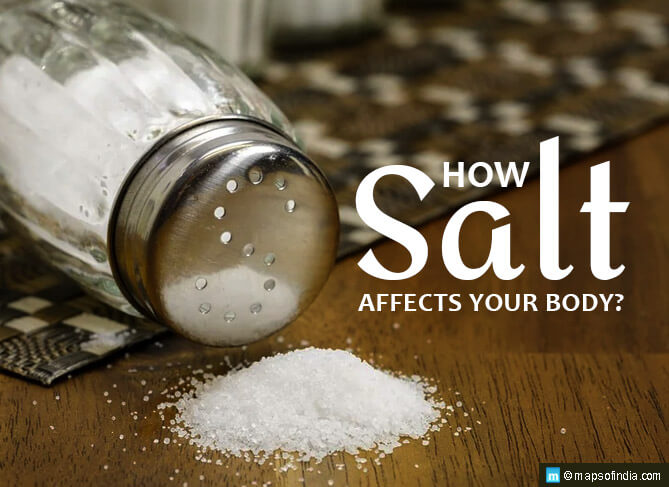
Salt helps your body to hold on to water by working on your kidneys. If you consume more salt in your daily diet, it will store more water in your body, raising your blood pressure. That’s why it is important to consume salt in a balanced manner so that the blood pressure remains checked.
High blood pressure is not good for health because they put greater strain on a person’s heart, kidneys, arteries, and brain. Once this happens it may lead to chronic diseases such as strokes, heart attacks, kidney diseases, and dementia. High blood pressure patients should avoid having too much salt in their diet because diuretics and other blood pressure medicines don’t work effectively.
Now, let’s check the effect of salt on different parts of your body:
Kidneys
Kidneys help human body to remove unwanted fluid by filtering the blood. Extra fluid is then moved and stored in the bladder. Once the bladder gets filled, it creates pressure on the bladder wall. It signals the person about the increasing tension on the bladder wall, which makes the person to urinate the unwanted extra fluid out of the body.
The extra fluid is removed from the blood by the kidneys with the help of osmosis. This process uses a delicate sodium-potassium balance to suck the water out of the bloodstream across a wall of cells into a collecting channel, which in turn moves the extra fluid to the bladder.
When you consume extra salt, the delicate sodium-potassium balance in the kidney’s osmosis process gets affected as the sodium level in the bloodstream goes up. Once this happens, the kidneys’ ability of removing the water gets reduced. This leads to accumulation of extra fluids in the bloodstream, putting extra strain on the blood vessels. That’s how eating extra salt increases blood pressure.
Over an extended period of time, continued extra strain damages kidneys. The kidneys’ ability of reducing toxic and unwanted waste products decreases, leading to their accumulation inside body. If you don’t take medicine to heal your damaged kidneys for long, kidney failure may also take place.
You should take diuretic medication for treating blood pressure, which in turn removes more fluid from the bloodstream, keeping the blood pressure normal.
Arteries
Consuming too much salt causes blood pressure to increase, putting extra strain on the inner walls of the arteries. In response, the tiny muscles in the artery walls become stronger and thicker, which constricts space inside the arteries and raises blood pressure further. The cycle of blood pressure increase over years may either cause the arteries to burst or clog up entirely. Once this happens, different body organs don’t get adequate oxygen and nutrients, damaging organs. In fact, the consequences can be fatal too.
Heart
High blood pressure adversely affects the arteries, as mentioned above. This may lead to angina, sharp pains in the chest area when you are active. In such a condition, when you keep on consuming extra salt, the arteries burst or get completely clogged. That’s when heart attack takes place. You should eat less salt to avoid any of the above mentioned problems.
Brain
Arteries also take blood to the brain. Once the increased blood pressure damages or constricts these arteries, it may cause vascular dementia. This is caused when blood flowing to brain gets reduced due to constricting arteries. If the condition is not treated and salt intake is not lowered, it may lead to brain stroke.
Conclusion
To avoid increasing blood pressure, avoid consuming extra salt.
Related Link:
How to Avoid Diabetes and High Blood Pressure?





